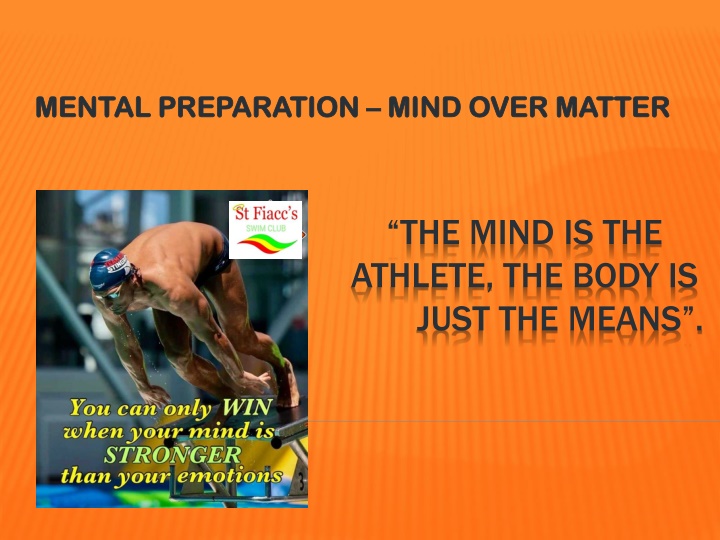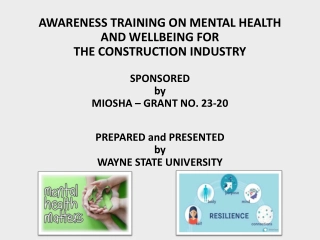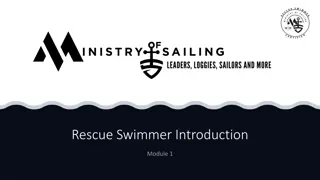Mental Preparation and Characteristics of Swimmers
In the competitive world of swimming, mental preparation and key characteristics play a vital role in achieving success. From positive/negative thoughts swimmers have to tips for the best mental preparation, this content provides valuable insights into cultivating the right mindset for peak performance in the pool. Concentration, emotions, confidence, and preparation strategies are highlighted to help swimmers excel in their sport.
Download Presentation

Please find below an Image/Link to download the presentation.
The content on the website is provided AS IS for your information and personal use only. It may not be sold, licensed, or shared on other websites without obtaining consent from the author.If you encounter any issues during the download, it is possible that the publisher has removed the file from their server.
You are allowed to download the files provided on this website for personal or commercial use, subject to the condition that they are used lawfully. All files are the property of their respective owners.
The content on the website is provided AS IS for your information and personal use only. It may not be sold, licensed, or shared on other websites without obtaining consent from the author.
E N D
Presentation Transcript
MENTAL PREPARATION MENTAL PREPARATION MIND OVER MATTER MIND OVER MATTER THE MIND IS THE ATHLETE, THE BODY IS JUST THE MEANS .
Characteristics Most Valued in a Swimmer Commitment Dedication Trier Coachable Doesn t give up Attitude Fun/Team Player Fearless
Positive and negative thoughts swimmers have before/during/after a race I hate this stroke/distance, why does my coach/parent make me swim it? Oh my God the swimmer next to me is really fast I can do this, I do it all the time in training. Don t take it out too fast but not too slow either, wait what s the right speed? The swimmer next to me is really going for it but I m staying with them, I m not going to let them pull ahead. I went out too fast, this is starting to hurt!!! How is everyone picking up speed?????? Fight through the pain, once my shoulders go numb I won t be able to feel it anyway. Pick it up, it ll be over in 20 seconds, I can rest all I want then. Kick for the wall, head down, no breath. Is everyone as tired as me? I am never swimming that event again. That wasn t so bad, why was I complaining in the first place? I actually love that event!!
TIPS TO THE BEST MENTAL PREPARATION For athletes, being organised applies to everything, especially mental preparation. While of course an athlete can t perform without adequately training, it s also true that they need to be in the right frame of mind. Why Why Prepare? Prepare? In the zone In the zone Many athletes talk about getting in the zone, it s not just a buzzword, it s a fact. Getting in the zone mentally before a big race will give you a real advantage. It will help you focus and better perform, as well as block out distractions. Motivation Motivation You need to have a plan in place and goals to achieve. PB/Qualifying Time/Squad Promotion Time/Make a Final/Podium Finish
Concentration Concentration If it s all about focus, having a plan in place, have a strategy and understanding the steps involved. Emotions Emotions It can be easy to lose control of your emotions in sport. But, good preparation will equip you with the right skills in place to be able to better deal with them. Anticipate the issues that lie ahead, which in turn prepare you better for dealing with any eventuality. Confidence Confidence Feeling confident and assured is a by-product of being prepared. Maintaining a positive composure is important in this game, and self-belief plays a large part of this. Give yourself the best shot of success, by being well prepared for every eventuality and see how it can boost your confidence.
How To Prepare How To Prepare? ? 1. Thought 1. Thought M Management Our thoughts shape our actions, how we can better manage these? Talk through issues, and mental blocks with your coach/team mates, as a way to overcome them. Mention negative as well as positive thoughts. Communication is cathartic and can help overcome a number of issues and may even boost your confidence. anagement 2. 2. Imaging Imaging Imaging is the role of positively visualising the journey to success. It goes beyond the glory of winning, and forces you to rehearse and think the steps required to get there. Days before a race, visualise every step, swim the race in your head, the dive, underwater, breakout, every stroke, turn, breakout and finish.
3. Deep 3. Deep breathing breathing Mental preparation is about controlling inside thoughts. A tried and tested technique is deep breathing, or guided breathing. This can take a number of weeks to master, but it forces your body and mind to come together. The deep breaths in expand your lungs, filling you with oxygen while mentally you re helping yourself to calm down. This will also prove useful ahead of events and times of stress when your physical and psychological arousal needs managing. 4. Have 4. Have a playlist a playlist Music has the power to inspire, motivate and reframe the way you think. 5. 5. Goal setting Goal setting Working with your sports coach, you should already have established a framework for success in your training programme. Be it performance, process or outcomes, think about the short, medium and long-term goals you need to set in order to achieve these.
6. 6. Warm Warm- -up Routines up Routines It might be specific stretches or warm up routines, or it could be guided breathing techniques. With a focus on wellbeing, this really is about both body and mind connecting. 7. 7. Relaxation Relaxation We know that mental fatigue can take its toll on athletes before they ve even stepped foot onto a sporting stage. Therefore, conserving energy prior to an event is important. 8. 8. Self Self- -talk Key to mental preparation is keeping a positive mind-set. Having a pre- performance routine that involves focusing on positive thoughts will help block out external distraction and focus the mind. Importantly, it is a reminder to focus on the things we can control, letting go of the areas one cannot influence focus on the things we can control, letting go of the areas one cannot influence. Use cue words. talk DON T OVERTHINK THE SWIM , FEEL IT DON T OVERTHINK THE SWIM , FEEL IT
Learn From Your Mistakes Learn From Your Mistakes Bounce Forward From Failure Bounce Forward From Failure Reflection Reflection Acknowledge positives and negatives from your Acknowledge positives and negatives from your performance. What worked? What might you do differently next time? performance. What worked? What might you do differently next time? What do you need to work on in training? What do you need to work on in training? Perspective Perspective you are your harshest critic. Do a post you are your harshest critic. Do a post- -race debrief with coach. Forgive yourself and move on. coach. Forgive yourself and move on. race debrief with Coping Coping spot the negative cues and learn to deal with the situation spot the negative cues and learn to deal with the situation better in the future. better in the future. Resilience Resilience it s hard to beat a person who never gives up it s hard to beat a person who never gives up Planning Planning How do you improve for the next time? How do you improve for the next time? Responsibility Responsibility tiredness/injury/conditions/kit/tiredness/coach tiredness/injury/conditions/kit/tiredness/coach own your own performance your own performance own
Teamwork Teamwork learn the value of teamwork and support, you are all going through the learn the value of teamwork and support, you are all going through the same experience same experience. . Problem Solving Problem Solving - - makes us versatile and able to tackle any situation, knowing that makes us versatile and able to tackle any situation, knowing that there are hurdles to face, but they can be overcome. there are hurdles to face, but they can be overcome. We through our mistakes. It drives us to find different solutions, urges us to try new ways, through our mistakes. It drives us to find different solutions, urges us to try new ways, makes us makes us consider an alternative approach. Without failure, without mistakes, consider an alternative approach. Without failure, without mistakes, without knock without knock- -backs, we never backs, we never learn how to overcome obstacles learn how to overcome obstacles. . We learn how to problem solve learn how to problem solve Knowledge Knowledge - - O One broken, new feats achieved and fears conquered. A vital part of being an athlete is broken, new feats achieved and fears conquered. A vital part of being an athlete is acknowledging and acknowledging and appreciating the value appreciating the value of this gift. We are all on the same journey, but learning at our own pace. but learning at our own pace. Be grateful for the knowledge Be grateful for the knowledge we are given through our mistakes; it helps us mistakes; it helps us appreciate the present appreciate the present and the future. ne is is always learning and improving. It s why records continue to be always learning and improving. It s why records continue to be of this gift. We are all on the same journey, we are given through our and the future.
Finally, when you are standing on the blocks Finally, when you are standing on the blocks just before the whistle blows remember just before the whistle blows remember You have nothing to lose, your life does not depend have nothing to lose, your life does not depend on this result. on this result. You























